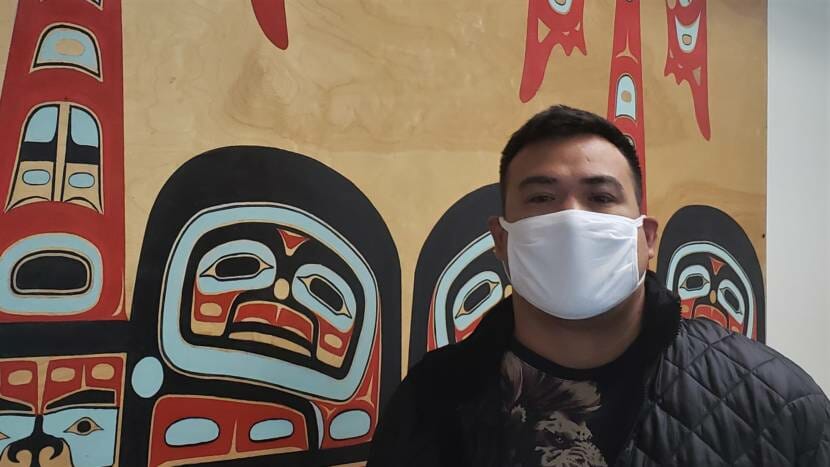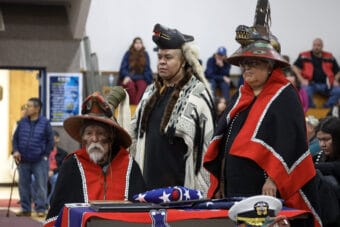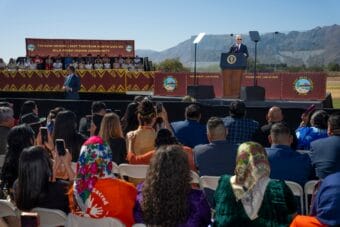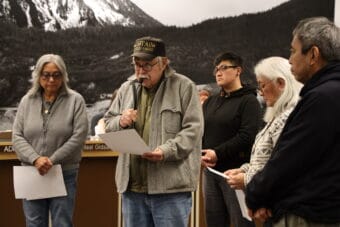
Two more pandemic relief programs opened this week that thousands of Tlingit and Haida tribal members and Goldbelt shareholders are eligible for. People who fall into both categories can get up to $3,600 in one-time payments.
Nathan Johnson recently applied for a $1,000 grant available to enrolled members of the Central Council of Tlingit and Haida Indian Tribes of Alaska. Johnson is from Angoon, where he used to work seasonal jobs. The pandemic shut down most travel and made life a lot tougher there.
“Our store was running low on food,” Johnson said. “And that’s the main reason why I moved to Juneau, so I can try to work more.”
Grandparents are looking after his three young children in Angoon. He wants to bring them over and be a father to them. About three months ago, he started working at a pizza restaurant and is saving up for an apartment his family can live in.
“An extra $1,000 means, at least, a couple weeks to at least a month closer to my kids,” he said. “It means that I get to be fed well, I could have more energy for my job. I could prep for the winter. I could pay off my phone. It’s a big help.”
He said getting his application in was like “a big mountain off his shoulders.”
Tlingit and Haida’s program is funded by the American Rescue Plan Act, which federal lawmakers passed in March.
Another relief program opened recently that’s available to shareholders in Goldbelt Inc., the urban Alaska Native corporation for the Juneau area. Each shareholder can get up to $2,600. To be eligible, shareholders must be U.S. citizens and be able to show how the COVID-19 pandemic impacted them financially.
Goldbelt has more than $11 million available for this program. That’s more than enough to make the maximum payment to every single one of the corporation’s nearly 4,000 shareholders.
“If you don’t file an application, it’s not going to help somebody else,” said Goldbelt CEO McHugh Pierre. “We have enough money for everybody to get the full amount if they can demonstrate the need. So I want everyone to apply, justify your amount, and we will reimburse you for those costs up to $2,600.”
The application period closes at the end of September. Pierre said the leftover money will go to another relief program to be determined in October. It must be spent by the end of the calendar year.
As of Thursday afternoon, Pierre said Goldbelt had gotten more than 1,400 applications, and certified about 800. Payments will start going out next week.
Pierre said Goldbelt’s leadership made plans for the program early on in the pandemic last year but shelved them after court cases came up affecting the funding. The money comes from last year’s federal CARES Act.
“I mean, they should’ve had it last year and they didn’t,” Pierre said. “They weren’t allowed to have it, you know, due to the legal complications. But now that those are resolved, we want to get it into our shareholders’ hands and help them out in this difficult time.”
The CARES Act quickly sent relief money out to individuals, businesses, nonprofits, as well as state, local and tribal governments. But not to Alaska Native corporations because several Lower 48 tribes challenged the corporations’ eligibility for these funds.
The U.S. Supreme Court decided in June that Alaska Native corporations are eligible for a share of the $8 billion in CARES Act money set aside for tribes. Alaska Native corporations are specifically mentioned in the eligibility definition that the CARES Act uses.
While the lawsuits pit Alaska Native corporations against tribes in the Lower 48, Pierre said Goldbelt has a strong relationship with Tlingit and Haida. Pierre said everyone in the community benefits from that.


